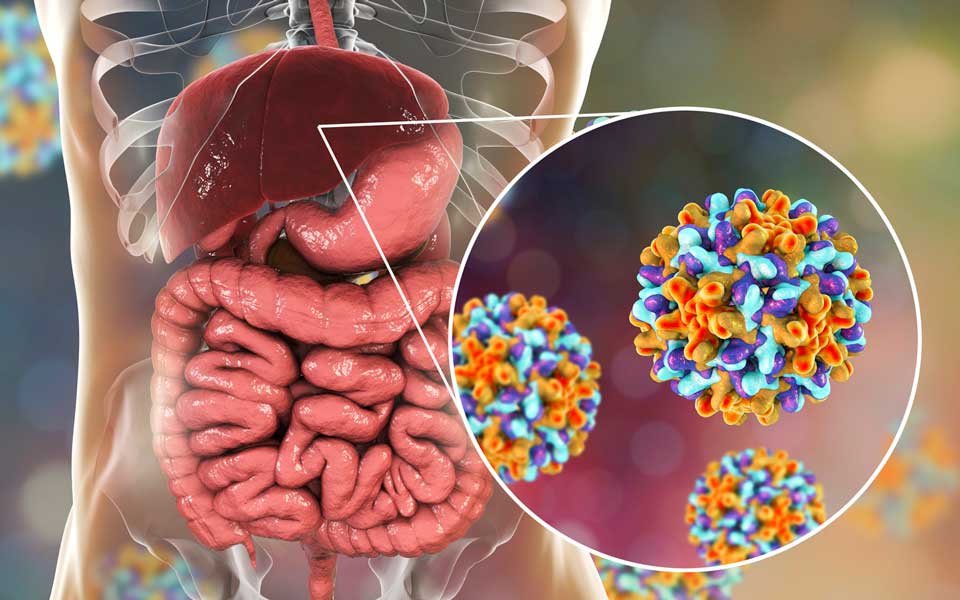Herbal Help for Hepatitis

Hepatitis B and hepatitis C viruses cause chronic infections. Hepatitis C is one of the main causes of fibrosis in the liver. Both type of hepatitis are major risk factors for liver disease and liver cancer. Some experts think the viral infections are the main cause of the most common type of liver cancer (hepatocellular carcinoma). (vii.166, 307, 308)
Hepatitis C has also been implicated in several other conditions:
- Viral myocarditis, a dangerous inflammatory condition that enlarges the heart. (vii.245)
- Gallstones, although experts are unsure of the reasons for this. (vii.129)
- Oral lichen planus, a common condition of the mouth and skin. (vii.309)
Complications from hepatitis viral infections correlate to viral activity. The goal of treatment is therefore to reduce viral activity and flare-ups of the condition. Typically conventional treatments work by reducing the virus' ability to replicate. However, some of the limitations of current antiviral drugs include: (vii.310, 311)
- Development of drug resistance.
- Serious side effects.
- Antiviral activity is only specific to certain types of the virus.
Researchers suggest that turmeric and its compounds could help overcome some of these shortcomings. (vii.310)
How Can Turmeric Help?
Turmeric and its curcumin compounds have a number of beneficial properties that could help limit the infectivity of hepatitis viruses. Both turmeric and curcumin have direct antiviral effects as well as helping to regulate the liver cell's response to the virus in a beneficial way. (vii.310, 312)
They also prevent the harmful fibrotic effects of hepatitis viruses in the liver. Turmeric oil has even been shown in a clinical study to help treat liver cancer. (vii.312-314)
Study Results
| Turmeric Compound/Form | Type of Study | Study Results |
|---|---|---|
|
Curcumin |
Lab |
Various concentrations of the turmeric compound significantly inhibit hepatitis B (HBV). This study showed that one of the ways curcumin works is by blocking expression of PGC-1α, a protein involved in energy metabolism. HBV triggers production of PGC-1α in order to enhance its ability to replicate. (vii.310) |
|
Curcumin |
Lab |
Although curcumin didn't stop the virus from replicating in this study, it did show significant beneficial antiviral activity: (vii.313)
|
|
Curcumin |
Lab |
At below-toxic doses, turmeric's curcumin compounds blocked replication of hepatitis C virus in infected liver cells. Curcumin did so by: (vii.315) |
|
Turmeric |
Lab |
Hot water extracts of whole turmeric showed 85% inhibition of hepatitis B cccDNA without toxic effects on liver cells. The virus' cccDNA is the key component that allows it to replicate and cause persistent infection. (vii.317, 318) |
|
Turmeric |
Lab |
Water extracts of turmeric suppressed hepatitis B from multiplying. It did this by promoting p53 type proteins. P53 is a protein that suppresses oncogenes and promotes cell death in damaged and infected cells. (vii.312) |
|
Turmeric |
Animal |
In a mouse model for hepatitis B, 50 mg/kg of body weight of turmeric prevented or delayed the development of liver cancer. In both early and late stages of liver disease, turmeric did this by: (vii.319)
Turmeric also reduced visceral body fat and enlarged livers. (vii.319) |
Join the 1000s of People Who Are Discovering the Benefits of Turmeric.

Healthceuticals® Turmeric Curcumin Complex
100% Certified
Organic ingredients
- Organic Turmeric Extract - standardized to 95% curcuminoids.
- Organic Whole Turmeric - provides full spectrum antioxidant, anti-inflammatory turmeric benefits, including turmerones and numerous vitamins, minerals, and phytonutrients
- Organic Black Pepper Extract - standardized to 95% piperine; dramatically enhances bioavailablity.
- Organic Phospholipids - markedly improve absorption.
- Organic Ginger - works synergistically with turmeric to provide more powerful benefits.
- Absolutely FREE of potentially harmful additives and fillers such as magnesium stearate.





Comments (2)
Now it's clear to all that I do not have Hepatits C, however I do have a fatty liver and have been worried about my chances of it progressing to
liver cancer. Turmeric sounds great for the liver. Will try.